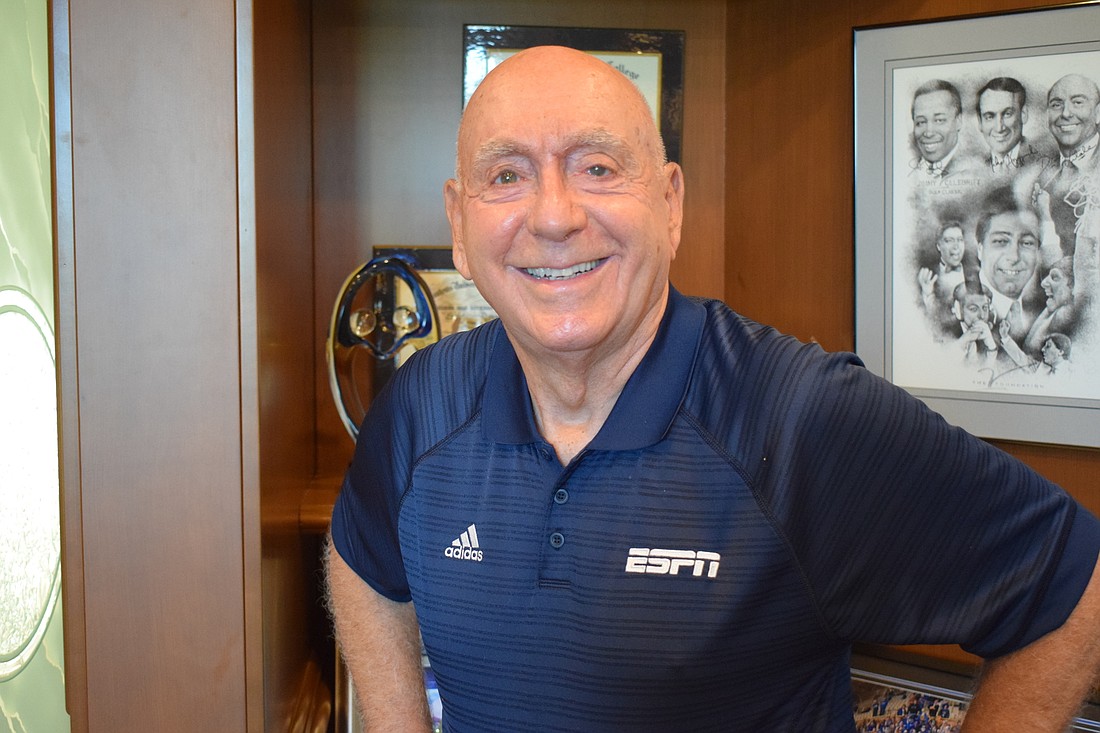- April 26, 2024
-
-
Loading

Loading

It was early Jan. 16 and Lakewood Ranch's Dick Vitale was at home, still going full speed.
He had a lot to get done in the next 24 hours before he flew to cover the Kentucky at Arkansas men's basketball game for ESPN.
Besides everything else, on Jan. 14 the 80-year-old Vitale was named the 2020 recipient of the NCAA President's Gerald R. Ford Award, which recognizes an individual who has provided significant leadership as an advocate for college sports.
Vitale, who will receive the award Jan. 24 at the NCAA Convention in Anaheim, Calif., was asked about his honor as he sat in his home office, but first he had a story to tell.
His memory flashed back to Michigan, at a time in the mid-1980s when his daughters (Terri and Sherri) had gone to the eye doctor for a check-up. They saw Dr. Bernard Giles, who noticed the girls' last name and asked if they were related to Dick Vitale. Then he made a bold statement to them.
"I can fix his drifting eye."
Vitale lost sight in his left eye as a 5-year-old when he was poked with a pencil. By the time he was a sophomore in high school, he had so much trouble with his bad eye he had to withdraw from his sophomore year.
Besides the medical problems, he learned about bullying. His bad eye would drift, and some of his fellow students were relentless in picking on him, sending him home in tears.
He lived with the problem through his days as head coach of the Detroit Pistons (1978-79) and early into his broadcasting career with ESPN, where he started in 1979.
When he heard Giles' statement he could fix the problem of his drifting left eye, he was intrigued. He met with the doctor, but then decided not to have the surgery when learning Giles would have to also do surgery on his good right eye in order to correct the drifting left eye. Since he made a living in the broadcasting world, Vitale didn't want to jeopardize his remaining sight.
A short time later, though, Vitale had done an ESPN show and had checked for messages from the viewers afterward.
A caller complained he didn't want to look at Vitale's bad eye on television, and he wanted ESPN to get him off the air. Vitale was so hurt he told ESPN producer Steve Anderson he wanted to quit. He went home to his wife, Lorraine, and told her how much it bothered him. All the years of bullying in school came rushing back.
The next day he called Giles to schedule the surgery.
"He took me out of thick glasses and put me in contacts," Vitale said. "It changed everything for me."
It was a roundabout path for Vitale to explain how perseverance is important in anyone's career.
"It doesn't matter if you are rich, it doesn't matter if you are famous," said Vitale, who moved to Florida in 1988. "Sometime in life you will have to deal with adversity."
Whatever adversity was thrown his way, Vitale's career has led to 13 hall of fame inductions (including the Naismith Memorial Basketball Hall of Fame) along with Gerald R. Ford Award.
He said the Gerald R. Ford Award is just one of the many honors that should go to his ESPN family.
"Those awards belong to a lot of them," he said.
"In four decades broadcasting college basketball, Dick Vitale has delighted fans with his infectious enthusiasm for the sport,” NCAA President Mark Emmert said. “His passion for college sports never ceases, and we are thrilled to recognize him for his career advocating for college athletes so they can succeed on the court and in life.”
Vitale asked Emmert about his inclusion.
"He said, 'It's about how much you care about the kids,'" Vitale said.